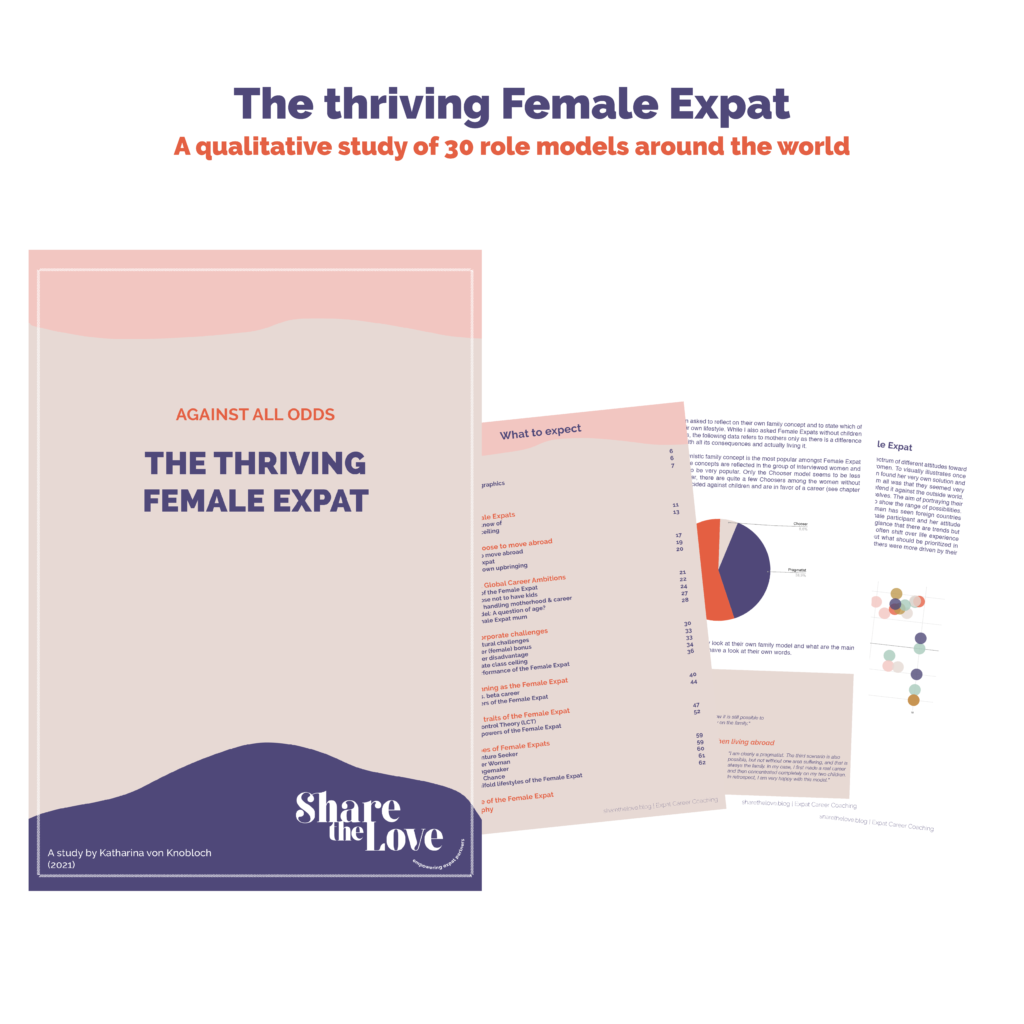
The global glass ceiling of the Female Expat
The percentage of female expats is raising but it is still far away from gender parity. I was interested to learn more about the reasons behind it and came across the concept of the global glass ceiling which I will explain in more detail in this post.
This is a small glimpse into my upcoming study of the „Thriving Female Expat! which will be published in October 2021 and which you can access here soon.
More about the Female Expat Study
I have interviewed 30 women around the globe who moved abroad to find professional and personal happiness. The study gives answers to the questions on how they managed to get there, how they incorporate work and family planning and what career means to them.
Where to download?
To contribute to the discussion of gender parity in global mobility, I am offering the report of this study for free. You can download it following this link after signing-up to the SharetheLove newsletter.
About the global class ceiling for Female Expats
Let’s start with a short introduction to the concept of a glass border. Many have researched this topic (Harris, 2002, Linehan and Walsh, 2001, Vance and Paik 2001, and van der Bergh and du Plessis 2013. Despite dual-career couples and the gender debate in leadership positions, women are still often overlooked for international assignments. Hence women are underrepresented and their careers are stagnating due to the „glass border“.
“Women who wish to pursue careers abroad have to overcome many barriers such as tokenism, stereotypes and first have to break through the glass ceiling in their home country before being able to break through the glass border.“
According to research, this global glass ceiling is full of myths and yet difficult to breakthrough. Many arguments why there are so few Female Expats seem to have fallen out of time. I have challenged each of these reasonings in my 30 conversations with Female Expats within the upcoming study and not infrequently I have been met with amazement or incomprehension that these reasons are still discussed to be contributing to this disparity.
In academic research, many papers are tackling the questions of the missing Female Expat with the most common 3 potential reasons for this low number and partially debunking these reasons as modern myths.
These three reasons or myths are going back to the essential work by Adler (1984b, 1994) decades ago.
The 3 myths
Myth 1: Individual
the woman does not want
Myth 2: Organizational
biases in the selection process
Myth 3: Cultural
Host country prejudices
In the following, I present a definition of each myth, a short overview of the work that has been done already to question those myths, and the responses of my very own research amongst 30 international savvy and professional women.

Mytha 1: Individual
The supposed lower willingness of women to accept international assignments
What does it mean?
This myth expresses the idea that women have been socialized into a female gender role and are consequently not interested in international assignments. Beyond their own control, the natural focus lies on family life while seeking power and linear corporate career success are not emphasized. As a result, women reject foreign assignments or assess their qualifications as not good enough compared to male colleagues.
Is that true
Since the 80s, many researchers have been investigating this myth. Adler herself revealed in her empirical studies that there was no difference between female and male MBA students. Many researchers after her looked into the reasons why women might shy away from international opportunities. While there is most certainly a different approach of career planning between men and women (more on that here 7.1), the female identity can actually be of advantage when pursuing a career abroad:
- Taylor & Napier, 1996: Female Expats in Japan reported advantages through greater visibility, better skills in building interpersonal relationships compared to men, and greater ability to adapt to the life of an outsider abroad
- Bastida (2017): No significant differences between gender in terms of work performance among 139 Spanish medium and high skilled workers. While the work performance was mostly the same, women had higher interaction and work adjustment levels than men.
What the Female Expat has to say about this
For the women interviewed, working abroad was a choice they have actively made. While for some this meant sacrificing the traditional family life or having children, others managed to take their family with them on the road. Most interview partners have been very proud of the fact that they established this global life for themselves. From these study findings, one can conclude that the willingness of women to go abroad is more based on personality (similar to men) and the question of how to incorporate family and personal life. However, many participants stressed that their expatriation came at a price (sacrificing the traditional family model) or that the partner was a crucial part of the decision-making process.
Myth 2: Organizational
Western managers are reluctant to send women abroad
What does it mean?
This myth expresses the idea that western managers are hesitant to send women abroad. As international assignments are costly, women are seen as a high-risk operation. Managers either see the woman itself as a risk factor or the surrounding context. Arguments often mentioned are physical safety, hazards involved in traveling in developing countries, isolation and loneliness, possible negative reactions of superiors, subordinates, clients, and colleagues towards women in managerial positions (Adler, 1994, Janssens et al 2006).

Is that true?
Many research papers come to the conclusion that women are struggling with the male-dominated hierarchy that leads to male managers judging the suitability of female subordinates. Typical difficulties within the international transfer process (as mentioned in Janssens et al 2006) are:
- Selection procedures, training, and preparation (Mayrhofer & Scullion,2002)
- Senior managers’ prejudices (Adler,1994; Harris,1995; Stroh et al.,2000)
- The exclusion of women from formal and informal networks is fundamental for upwards mobility (Izraeli & Adler,1994; Linehan & Walsh,1999; Mayrhofer & Scullion,2002).
- The fact that expatriate positions tend to be relatively high in authority and status (Edstro¨m & Galbraith,1977)
What the Female Expat has to say about this
All 30 women interviewed managed to overcome any potential corporate barrier in the international transfer process. Some argued that their industry is very gender neutral and that they did not experience any discrimination (e.g. Banking & Tourism). Others mentioned that they had been discriminated against and that they benefited from their confident and strong character to overcome those barriers and a strong will for a life abroad.

Myth 3: Cultural
Women are not effective in other cultural environments
What does it mean?
This myth expresses the idea that women are less effective in other cultural environments because of prejudices by foreign managers against female managers. This is supposed to be especially relevant in women-unfriendly environments and leads to less efficiency.
Is that true?
Within the conversations with the 30 Female Expats the cultural barrier was way less dominant than anticipated. Only a few reported that cultural differences and prejudices by local men have been a real showstopper. For some, this challenge was more a motivator and increased their work effort, for others it felt like paving the way for the next generation. Others actually profited from being a woman – mostly in very male-dominated cultures (e.g. Dubai).
What the Female Expat has to say about this
All 30 women interviewed managed to overcome any potential corporate barrier in the international transfer process. Some argued that their industry is very gender neutral and that they did not experience any discrimination (e.g. Banking & Tourism). Others mentioned that they had been discriminated against and that they benefited from their confident and strong character to overcome those barriers and a strong will for a life abroad.
The potential reasons for the low percentage of Female Expats are manifold. In any case, all three myths portrait that women are not in a position to actively change these obstacles. Common barriers are societal pressure on the role and life priorities of women, male-dominated HR processes, and local cultural prejudices against women. While many studies show that these are not to be found true they are still being discussed as the main reasons for the lack of female senior management abroad. With my work and my study, I aim to highlight those challenges and share all the different approaches women took to overcome the challenges. If you want to access the study go here or send me a direct message to info@sharethelove.blog. I am looking forward to sharing more insights from this work!












3 Antworten
Planning an international move can be overwhelming, but with the right preparation, it becomes much easier. From decluttering to organizing essential items, every step counts toward a smooth transition. Check out these affordable residential moving services in Downtown Denver to ensure a hassle-free relocation experience.
Relocating to a new home can be stressful, but choosing the right moving company can make all the difference. Whether you’re moving across town or across the country, professional movers can help ensure a smooth transition. Discover the best residential movers in Downtown Denver for reliable and affordable moving services.
Relocating for new opportunities can be an exciting yet challenging experience, especially when moving with a family. Professional movers can help ease the stress by handling your belongings with care and efficiency. Consider the services of professional home movers in Downtown Denver to ensure a smooth and hassle-free move.